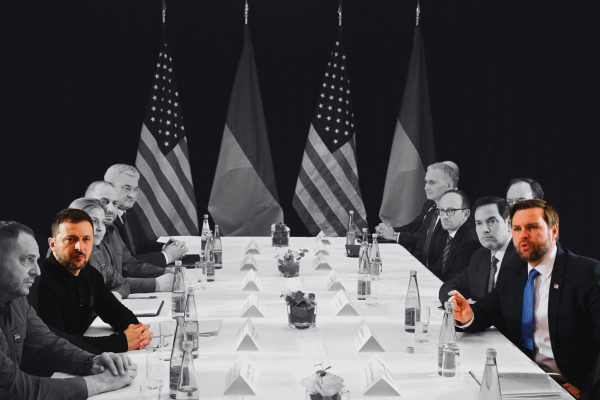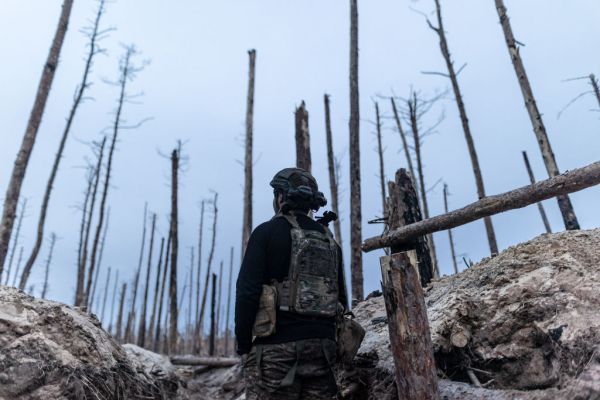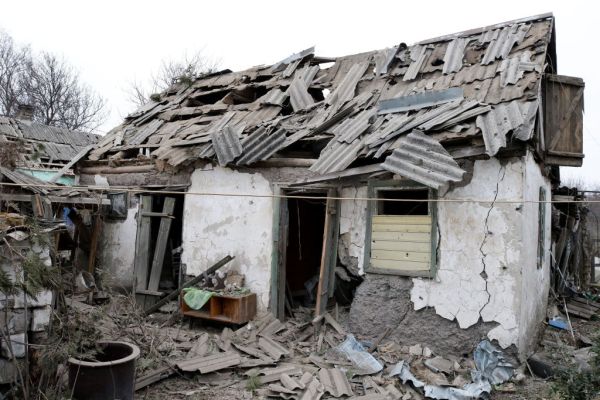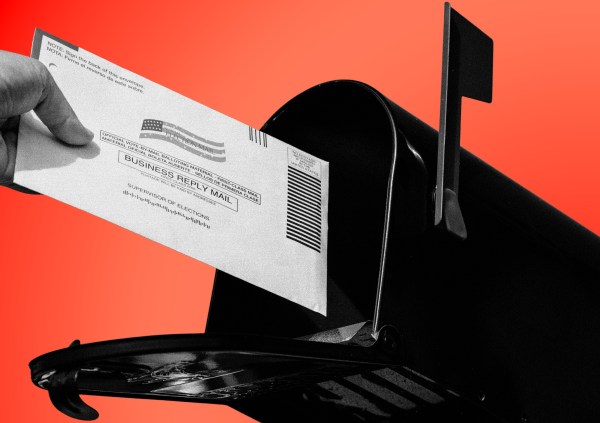Happy Tuesday! A “potentially hazardous” asteroid might hit the Earth in seven years, according to astronomers tracking its progress. SMOD, we still believe in you!
Quick Hits: Today’s Top Stories
- European leaders convened in Paris on Monday for an emergency security meeting prompted by the U.S. announcement of peace talks with Russia that would sideline European countries. The gathering followed speeches at last week’s Munich Security Conference by Defense Secretary Pete Hegseth and Vice President J.D. Vance that sharply criticized European defense commitments. European Union officials, NATO Secretary General Mark Rutte, and the leaders of France, Germany, the United Kingdom, the Netherlands, Italy, Poland, Denmark, and Spain met in the Élysée Palace, and French President Emmanuel Macron spoke with President Donald Trump after the meeting. Increases in European defense spending were expected to be a focus of talks, as well as the possibility of deploying troops to Ukraine as part of a security settlement. On Monday, British Prime Minister Keir Starmer said that he would be willing to deploy British troops in Ukraine as peacekeepers following a deal ending the Russia-Ukraine war.
- The Vatican provided a medical update on Pope Francis’ health Monday, saying that he remained in a “complex clinical situation” following his Friday admission to a hospital to treat what the Vatican is calling a “polymicrobial infection” of his upper respiratory tract. The 88-year-old pontiff had been suffering from bronchitis symptoms for several days before entering the hospital, forcing him to delegate planned speeches and to skip some public appearances. It is the fourth time he has been hospitalized during his pontificate.
- A team member from Elon Musk’s Department of Government Efficiency will be granted access to sensitive taxpayer data at the Internal Revenue Service, the New York Times reported Monday. The Washington Post reported Sunday that the White House was pressuring the IRS to sign a memorandum of understanding that would give officials from DOGE access to tax-agency systems, property, and datasets that include personal identification numbers and bank account information. “DOGE will continue to shine a light on the fraud they uncover as the American people deserve to know what their government has been spending their hard-earned tax dollars on,” said White House spokesman Harrison Fields.
- Secretary of State Marco Rubio attended meetings in Saudi Arabia on Monday, seeking to advance the Trump administration’s priorities in Gaza and to lay the groundwork for peace talks in the Russia-Ukraine conflict as Russian representatives flew to Riyadh. Ukrainian President* Volodymyr Zelensky landed in the United Arab Emirates late Sunday, although he is not expected to attend the meeting with Rubio, National Security Adviser Mike Waltz, Middle East envoy Steve Witkoff, and a delegation from Russia. Russian presidential press secretary Dmitry Peskov said Monday that Russian Foreign Minister Sergei Lavrov and presidential aide Yuri Ushakov would meet in Riyadh today with their American counterparts.
- The New York Times reported Monday that four of New York City’s deputy mayors—top officials in the city government—would resign following embattled Mayor Eric Adams’ apparent offer to help the Trump administration with immigration enforcement in exchange for the dismissal of the federal corruption case against him. The first deputy mayor Maria Torres-Springer, and deputy mayors Meera Joshi and Anne Williams-Isom, sent a joint email to staff Monday announcing their resignation. “Due to the extraordinary events of the last few weeks and to stay faithful to the oaths we swore to New Yorkers and our families, we have come to the difficult decision to step down from our roles,” they said. Deputy Mayor Chauncey Parker is also stepping down.
- Nineteen people were injured, including three in critical condition, after a Delta Airlines plane flipped Monday upon landing at Toronto’s Pearson International Airport. The reasons for the crash landing remain unclear, although video of the plane sitting upside down on the runway shows that it is missing a wing.
A Munich Redux

On September 30, 1938, the leaders of the United Kingdom, France, Italy, and Germany met in Munich to strike a deal that legitimized the Nazi conquest of Sudetenland in an effort to keep the rest of Czechoslovakia intact. Less than six months later, Germany broke the pact and continued its push into Czechoslovakia before setting its sights on Poland and France.
As Russia’s war in Ukraine enters its fourth year, the war-torn country’s European backers fear another Munich moment may be at hand. The Trump administration has signaled its desire to end the war at all costs, even if doing so comes at the steep price of Ukraine’s territory and future security, while simultaneously directing its ire at its European allies. Meanwhile, Ukrainian President Volodymyr Zelensky is pushing for European unity as his country attempts to repel Russian advances in eastern Ukraine.
The two competing visions for Europe’s security landscape were on full display at the annual Munich Security Conference this weekend.
Speaking at the summit on Friday, Vice President J.D. Vance declared that the biggest threat to the continent “is not Russia, it’s not China, it’s not any other external actor,” but rather what he described as Europe’s own flawed free speech and immigration policies. “What I worry about is the threat from within,” Vance said. “The retreat of Europe from some of its most fundamental values: values shared with the United States of America.”
Ukraine’s wartime leader, meanwhile, urged continued European resolve amid Russian aggression and American wavering. “Europe has everything it takes. Europe just needs to come together and start acting in a way that no one can say ‘no’ to Europe, boss it around, or treat it like a pushover,” Zelensky said Saturday, floating the creation of a European armed forces independent of NATO. “Let’s be honest, now we can’t rule out that America might say ‘no’ to Europe on issues that might threaten it.”
The dual addresses came amid President Donald Trump’s early push to negotiate an end to the war in Ukraine—a feat he wants to accomplish within 100 days. But the path to peace remains elusive as the administration projects often contradictory messages about the ongoing conflict and its causes.
Despite taking a tough tack with Russian President Vladimir Putin upon returning to the White House last month, Trump appears increasingly ready to reward Moscow for its decision to launch an unprovoked attack three years ago. In an interview with Fox News that aired last week, the president indicated that Ukraine “may be Russia someday.” Meanwhile, Defense Secretary Pete Hegseth laid out a U.S. stance going into negotiations with Russia that in many ways overlapped with the Kremlin’s own vision for ending the conflict. In addition to calling a return to Ukraine’s pre-2014 borders an “unrealistic objective,” Hegseth effectively ruled out Kyiv’s future NATO membership.
Ukraine itself has largely accepted that it will face difficult choices as it seeks to regain its occupied territory. Nearly 20 percent of the country is currently under Russian control. But it views security guarantees—such as the mutual defense pact afforded to NATO allies—as vital to staving off another invasion by Moscow. As we wrote last month:
Ukrainian President Volodymyr Zelensky has recognized that his country lacks the strength to end the war by expelling Russia from all Ukrainian territory. Over the last two months, Zelensky has pivoted toward focusing on the potential conditions of a deal to end the conflict, emphasizing the need for Ukraine to negotiate from a position of strength and for significant security guarantees from both Europe and the U.S. to accompany any agreement. He’s also begun a flattery campaign toward Trump—likely part of a bid to ensure Ukraine is not iced out of any U.S.-Russia negotiations.
But Zelensky’s efforts may come up short. Russian and American officials—including Secretary of State Marco Rubio, National Security Adviser Mike Waltz, and Middle East envoy Steve Witkoff—kicked off negotiations in Saudi Arabia today in the hopes of making progress toward a ceasefire in Ukraine. Noticeably absent from those deliberations, however, were Ukrainian representatives.
Speaking to “Meet the Press” from the Munich Security Conference, Zelensky said Sunday that he hadn’t received an invitation to the talks, adding that his country would “never” accept a deal struck between the U.S. and Russia without Ukrainian input. “We are thankful for all the support,” he said of Washington. “But there is not any leader in the world who can really make a deal with Putin without us, about us.”
European leaders scrambled to respond to Washington’s apparent efforts to push Kyiv toward a one-sided peace deal, holding an emergency summit in Paris on Monday to discuss the path forward. Some European countries have even floated putting boots on the ground in Ukraine to monitor and enforce any future ceasefire agreement. “Ready and willing. That’s my take from today’s meeting in Paris. Europe is ready and willing to step up,” NATO Secretary General Mark Rutte said Monday. “To lead in providing security guarantees for Ukraine.”
But even a unified Europe wouldn’t fill the gap left behind by the U.S. should it choose to relinquish its leadership role in the alliance. And any talk of how to manage postwar Ukraine may be premature as the conflict grinds on.
As the war approaches its fourth year, Moscow continues to make advances in eastern Ukraine. On Saturday, Russian forces claimed to have captured the village of Berezivka as they broke through Ukrainian defenses in the Donetsk region. With the talk of territorial concessions, thousands of displaced Ukrainians are now contending with the possibility that they may never return home. Russia’s cross-border aerial attacks on residential areas and critical infrastructure throughout Ukraine have also persisted. On Friday, Zelensky said that a Russian explosive drone had hit the Chornobyl nuclear power plant.
But Russia’s military gains come at a steep cost. The country has absorbed staggering losses on the battlefield, including in its own Kursk region, where Ukraine retains a foothold after launching a surprise offensive in August. Moscow has been forced to turn to its allies, including North Korea, to bolster its dwindling manpower. And it continues to suffer high inflation as a result of Western sanctions.
Whether or not the Kremlin will get a lifeline largely depends on President Trump. And despite European efforts to step up, Kyiv knows the fate of its defense rests squarely with Washington. Asked on Sunday whether Ukraine can continue to fight without U.S. support, Zelensky offered a bleak prognosis: “Probably it will be very, very, very difficult. And of course, in all the difficult situations, you have a chance. But we will have low chance—low chance to survive without support of the United States.”
Worth Your Time
- In The Atlantic, Marc J. Dunkelman argued that the progressive movement’s longtime impulse to distrust centralized power has hobbled the ability of the U.S. government to accomplish its goals. “Over the past half century, progressivism’s cultural aversion to power has turned the Democratic Party—purportedly the ‘party of government’—into an institution that almost instinctively seeks to cut government down. Progressives are so fearful of establishment abuse that reformers tend to prefer to tighten rather than loosen their grip on authority. The movement discounts whatever good the government might do in service of ensuring that it won’t do bad. And that’s driven well-intentioned reformers to insert so many checks into the system that government has been rendered incompetent,” he wrote. “Conservatism, of course, hasn’t been helpful in making government more effective. But for progressives, that reality can quickly become a distraction. They can’t control the MAGA agenda—but they can offer a more palatable alternative. If the progressive agenda is going to have a chance—if government is going to be given the leash required to combat inequality, to solve poverty, and to fight prejudice—progressives will first need to convince voters that government is capable of delivering on its promises.”
- In a bleak reminder of the stakes going into peace negotiations, Ukrainian journalist Nataliya Gumenyuk detailed the brutality of life under Russian occupation for Foreign Affairs. “From the outset, Russia has imposed a reign of terror on the towns and villages it has captured. In the aftermath of the initial invasion, in the south, in the east, and on the outskirts of Kyiv, residents in Russian-controlled areas were not allowed to leave their homes, and many of those who tried to flee were shot dead in their vehicles. Where there was active fighting, Russian forces often used Ukrainians as human shields, forcing civilians to stay in place so that the Ukrainian army wouldn’t shoot back,” she wrote. And a colonization effort is in full swing: “Even more bleak is the case of Mariupol … Over the past year, Moscow has heavily promoted the destroyed city to Russian settlers, claiming that the population has risen again to 240,000. In January 2024, clips from a Russian state television documentary about Mariupol’s new real estate market went viral. Designed as a PR film to promote the Russian reconstruction of the city, the documentary shows a Russian journalist casually walking through a residential unit in a bombed-out building—what the documentary refers to as a razrushka, ‘little wrecked apartment’—and talking with local real estate agents, who offer her the chance to invest in the abandoned ruins. The film crew walks through the debris, stepping over the belongings left behind by fleeing Ukrainians, while a cheerful voice speaks about a marvelous view from the balcony.”
Presented Without Comment
Elon Musk on X: “I am endlessly amused by the infinite indignities I suffer on the very platform that I own.”
Also Presented Without Comment
Politico: Mass Resignations From Eric Adams’ Administration Spark Chaos in NYC Government
In the Zeitgeist
The 4 Nations Face-Off—a hockey tournament that brings together teams from the U.S., Canada, Finland, and Sweden—got off to a rocky start last week, after U.S. players got into three separate fights with their neighbors to the north within 9 seconds of the game’s start. It’s probably safe to assume there will be more fireworks going into the final game between the U.S. and Canada on Thursday.
Toeing the Company Line
- In the newsletters: Kevin D. Williamson wrote about the Trump administration’s apparent betrayal of Ukraine, federal spending hypocrisy, and more.
- On the podcasts: Sarah Isgur and David French took to Advisory Opinions to discuss recent upheaval at the Department of Justice.
- On the site: John McCormack reports on the role of religious charities in refugee resettlement, Dan Currell unpacks the Trump administration’s recent attacks on the Department of Education, and Philip Wallach reflects on the erosion of the rule of law in the United States.
Let Us Know
What do you think the contours of a deal to end the war in Ukraine should look like?
Correction, February 18, 2025: Volodymyr Zelensky is Ukraine’s president, not prime minister.












Please note that we at The Dispatch hold ourselves, our work, and our commenters to a higher standard than other places on the internet. We welcome comments that foster genuine debate or discussion—including comments critical of us or our work—but responses that include ad hominem attacks on fellow Dispatch members or are intended to stoke fear and anger may be moderated.
With your membership, you only have the ability to comment on The Morning Dispatch articles. Consider upgrading to join the conversation everywhere.